
The COVID-19 pandemic has exposed the flaws and
vulnerabilities of the existing economic order including supply chains,
government funding and lifestyles. Both China and ASEAN economies have been
relatively successful in handling the pandemic, however the model of
post-COVID economy and social structure is still under heavy discussion.
Thus, a webinar titled “Post-COVID Economy: Thoughts on what China and ASEAN
can learn from each other” was jointly organised by China-ASEAN Business
Association (CABA) and UTAR with the
support of George Town Institute of Open and Advanced Studies (GIOAS),
Wawasan Open University on 19 June 2020 via Zoom.
Speaking at the webinar was Bristol University
Pro-Chancellor Tan Sri Andrew Sheng while moderating the webinar was CABA
Deputy President Datuk Seri Mohamed Iqbal.

Prof Cheng welcoming participants to
the CABA-UTAR webinar
Welcoming the participants to the CABA-UTAR webinar,
UTAR Institute of Management and Leadership Development Director Prof Dr
Cheng Ming Yu said, “On behalf of CABA-UTAR webinar working committee, I
would like to extend a warm welcome to all the participants. This webinar
aimed to promote a better understanding of the global economic situation and
to foster closer economic and social culture cooperation between China and
ASEAN especially during this time of the pandemic. We are indeed very
honoured to have Pro-Chancellor of Bristol University Tan Sri Andrew Sheng
and Deputy President of CABA Datuk Seri Mohamed Iqbal here with us today.
The lecture will draw on some preliminary lessons and thoughts on China and
ASEAN’s response and the difficulties faced by both parties.”
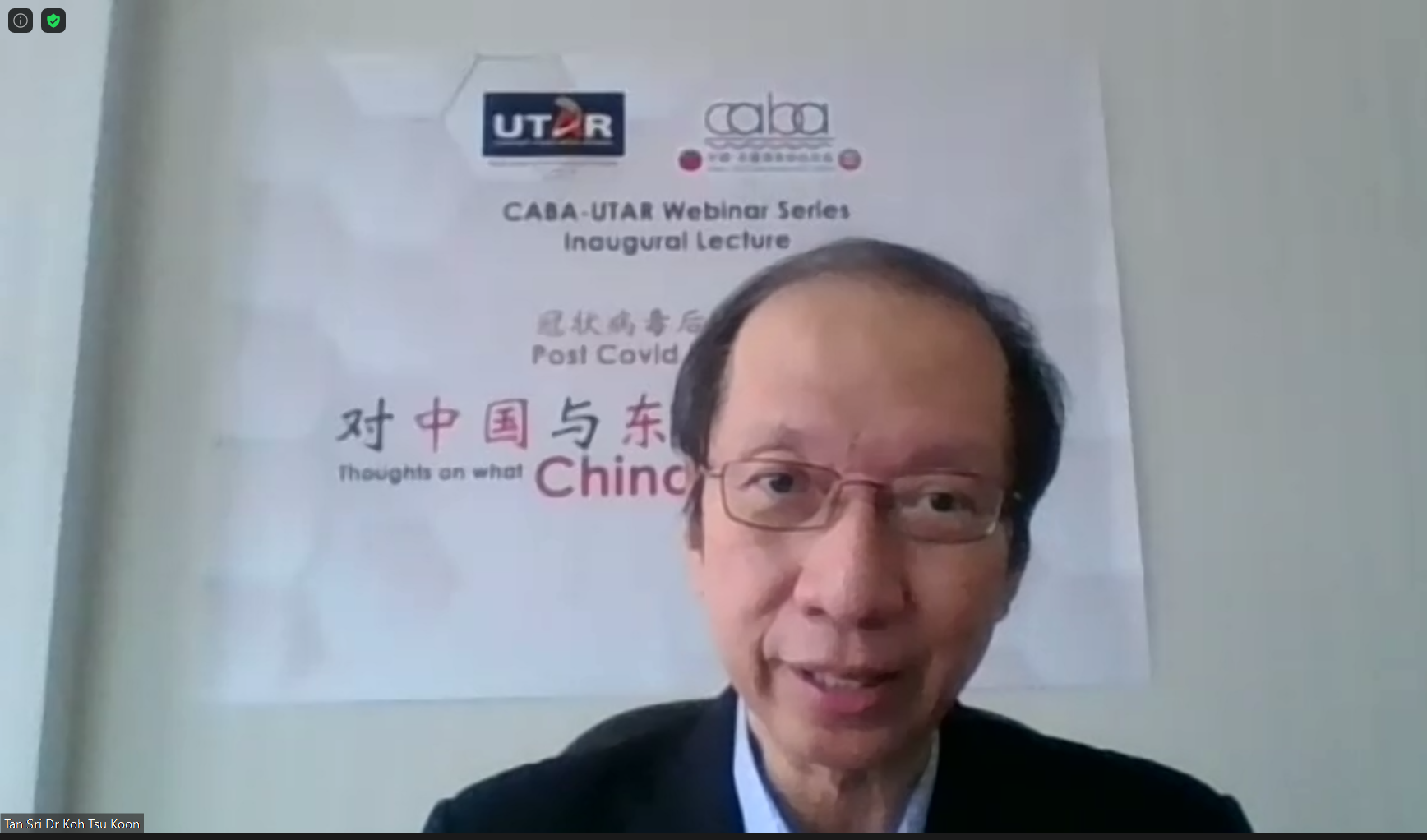
Tan Sri Dr Koh delivering his opening
remarks
CABA Advisor Tan Sri Dr Koh Tsu Koon said in his
opening remarks, “As the advisor of CABA, I would like to welcome all of you
on behalf of CABA President Tan Sri Dato’ Seri Lim Gait Tong.
CABA was founded in 2017. It has
organised more than 10 events to promote trade tourism and business as well
as social-cultural understanding between ASEAN and China. CABA would like to
take this opportunity to thank UTAR for cooperating with us on the CABA-UTAR
webinar series.”
“As many of you may be aware, during the first
quarter of this year, ASEAN became China’s largest trading partner for the
first time, surpassing both United Nations and the United States. This is
highly significant. The COVID-19 era and post-COVID-19 era pose many
challenges and issues of major concern. I believe Tan Sri Andrew would be
the most suitable person to give an overview of these issues and enlighten
us. We are glad and grateful to have him for this inaugural lecture,” he
added.

Datuk Seri Mohamed Iqbal introducing
the speaker
Datuk Seri Mohamed Iqbal introduced the speaker and
said, “I am very happy to be given the honour to moderate this webinar
series. The COVID-19 pandemic created a huge impact on the economy and
society all over the world. It is unprecedented and it will be ongoing,
never ending. Looking at Tan Sri Sheng’s professional skills and valuable
experiences, he is indeed very qualified to give this inaugural lecture. Not
to mention, the Time magazine named him as ‘100 most influential people in
the world’.”
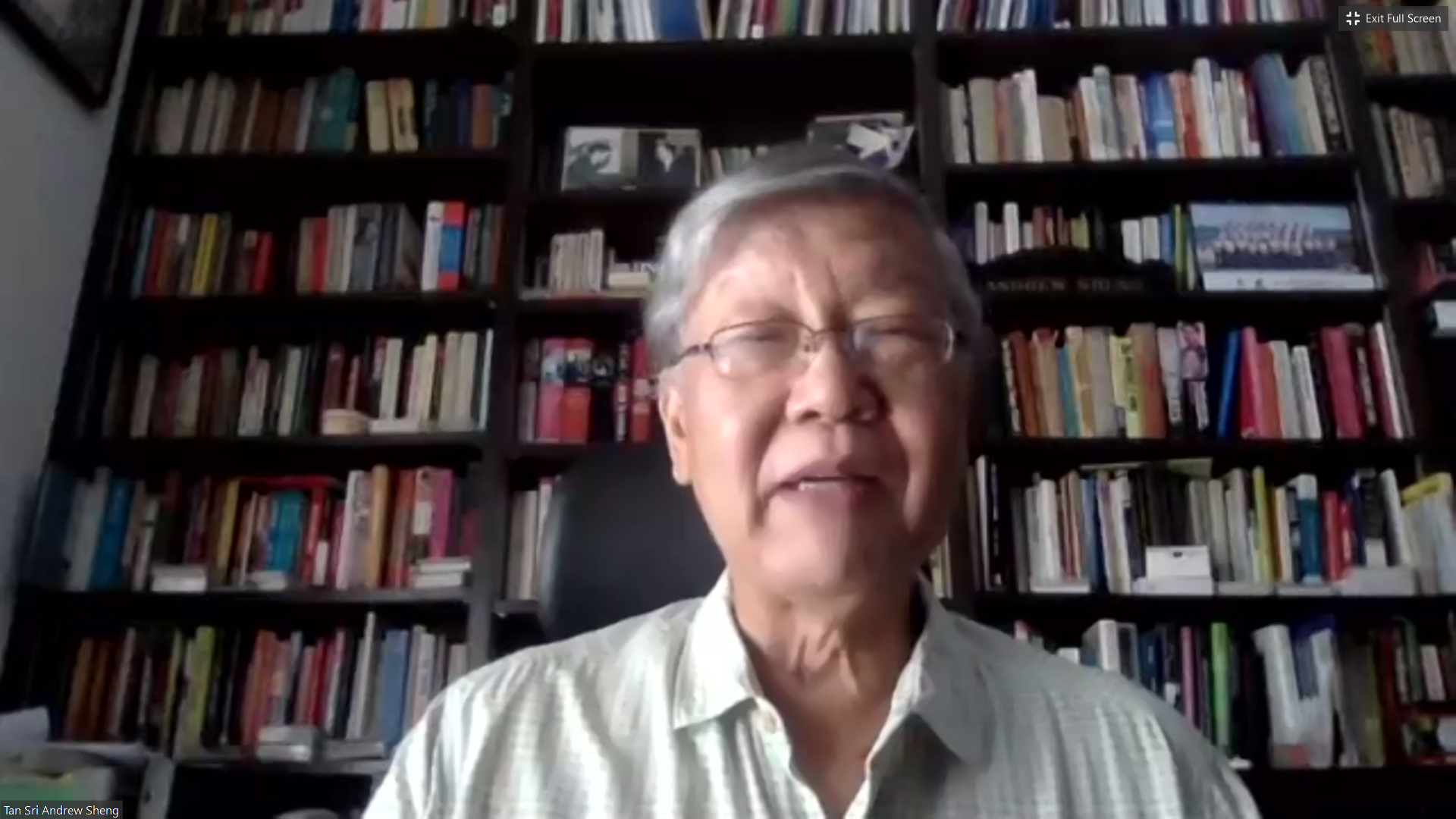
Tan Sri Sheng sharing his knowledge to
the participants
Tan Sri Sheng started the inaugural lecture by
sharing four key points to the audiences. He said, “Firstly, we are now
going through the worst pandemic with 8.4 million people being infected
around the world and with more than 450,000 deaths and it’s still spreading.
Secondly, our global economy is now moving into the biggest depression since
the 1930s, we are unlikely to have V shape recovery and all of us need to
prepare for two to three years of slow and painful adjustment. Thirdly, East
Asia had been the first to be hit by the COVID-19 virus and likely to be the
first to recover, however, the lesson that we need to learn is that we need
to have a different mindset and think about how we can recover and rebuilt
the post-COVID economy and society. Fourthly, China and ASEAN had
complemented each other very well since the relationship started. The China
market is large and mature, while ASEAN is young and growing with 600
million populations with great cultural diversity. But for now, we need to
overcome the challenges on how to commit to each other through the global
supply chain and open peaceful trade using digital transition.”
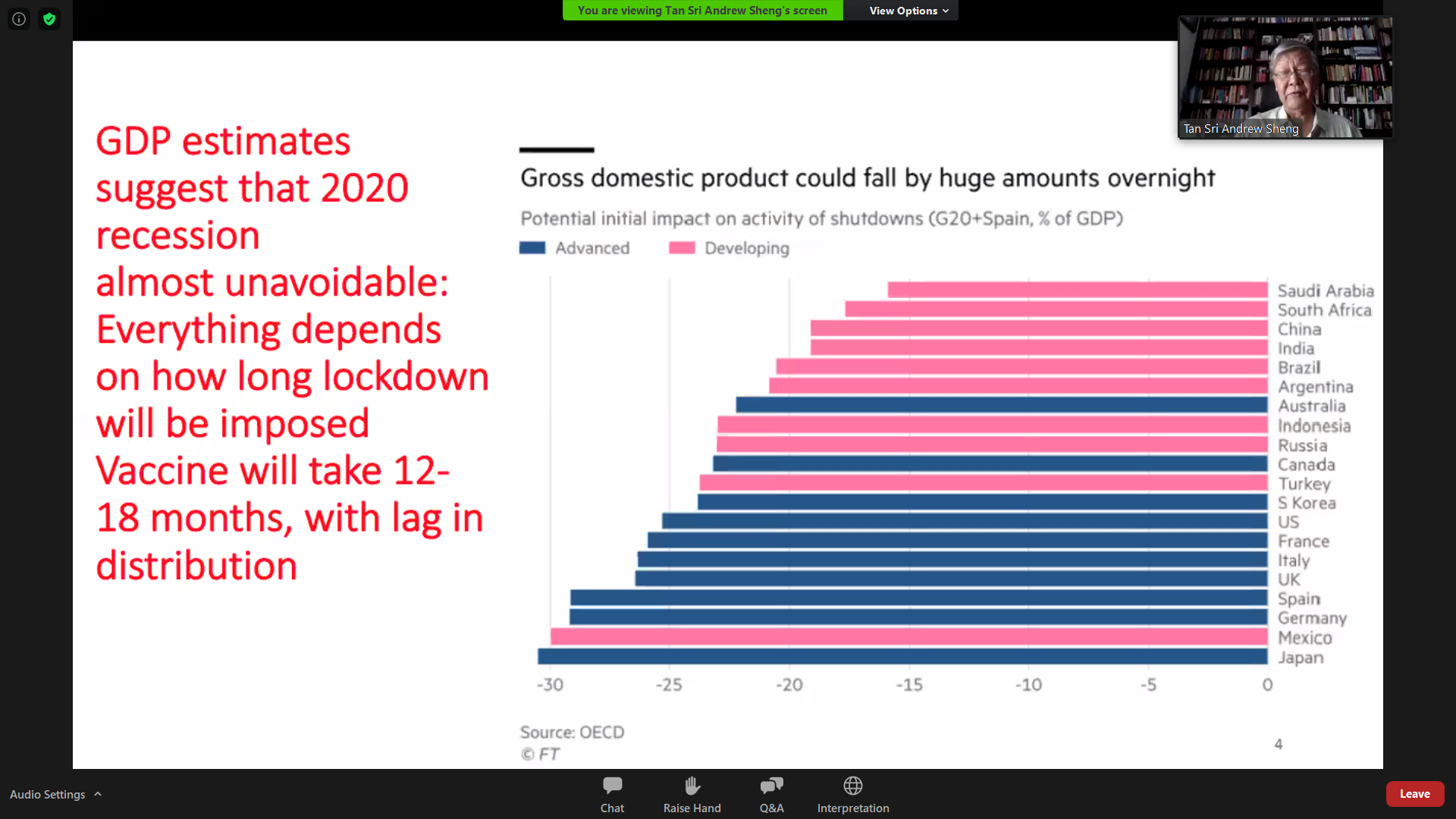
Tan Sri Sheng explaining the
unavoidable recession that would take place in 2020
Explaining how the gross domestic product (GDP) could
fall by huge amounts in 2020, Tan Sri Sheng said, “We are going to go
through a very different period for next 18 months until the vaccine is
found. By 2020, the recession would be unavoidable. The recession is very
likely to worsen, hence causing low growth. It will be slow to recover but
there will be no inflation for the moment.”
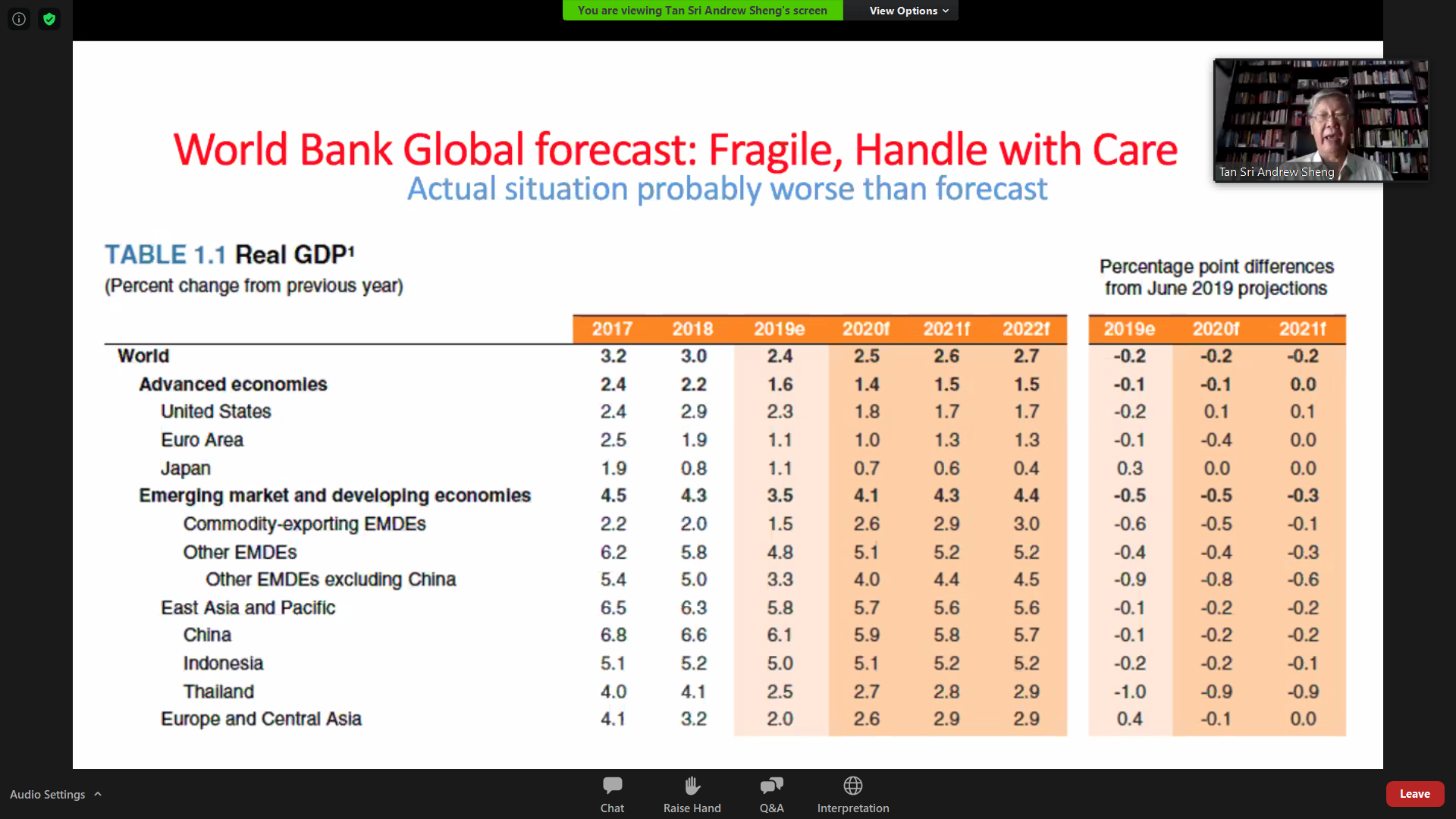
Tan Sri Sheng showing the forecast
from the World Bank Global
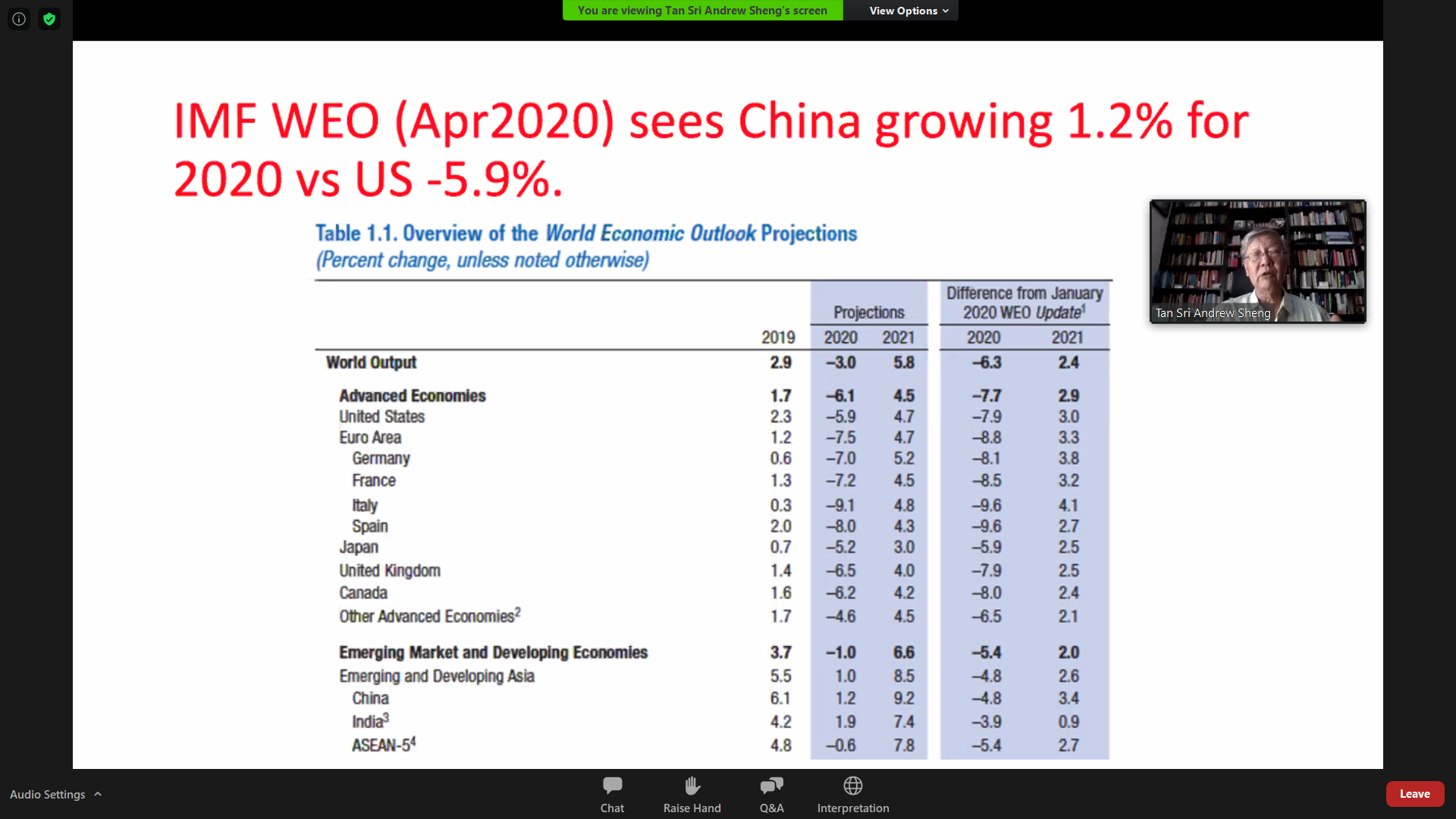
The IMF World Economic Outlook (WEO)
projected the depression faced by all economies
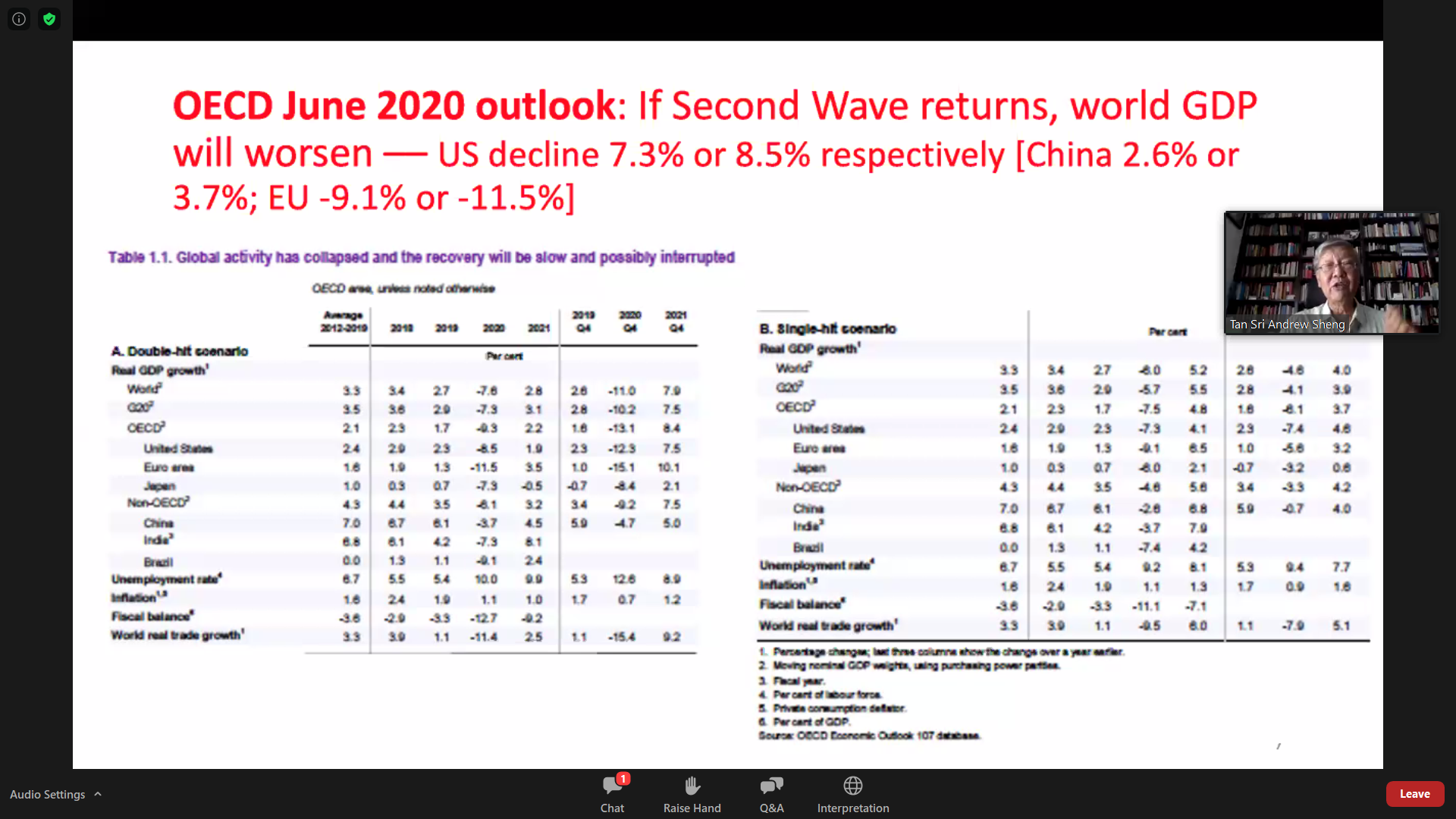
Organisation for Economic Co-operation
and Development (OECD) predicted that our world GDP will worsen if the
second wave returns
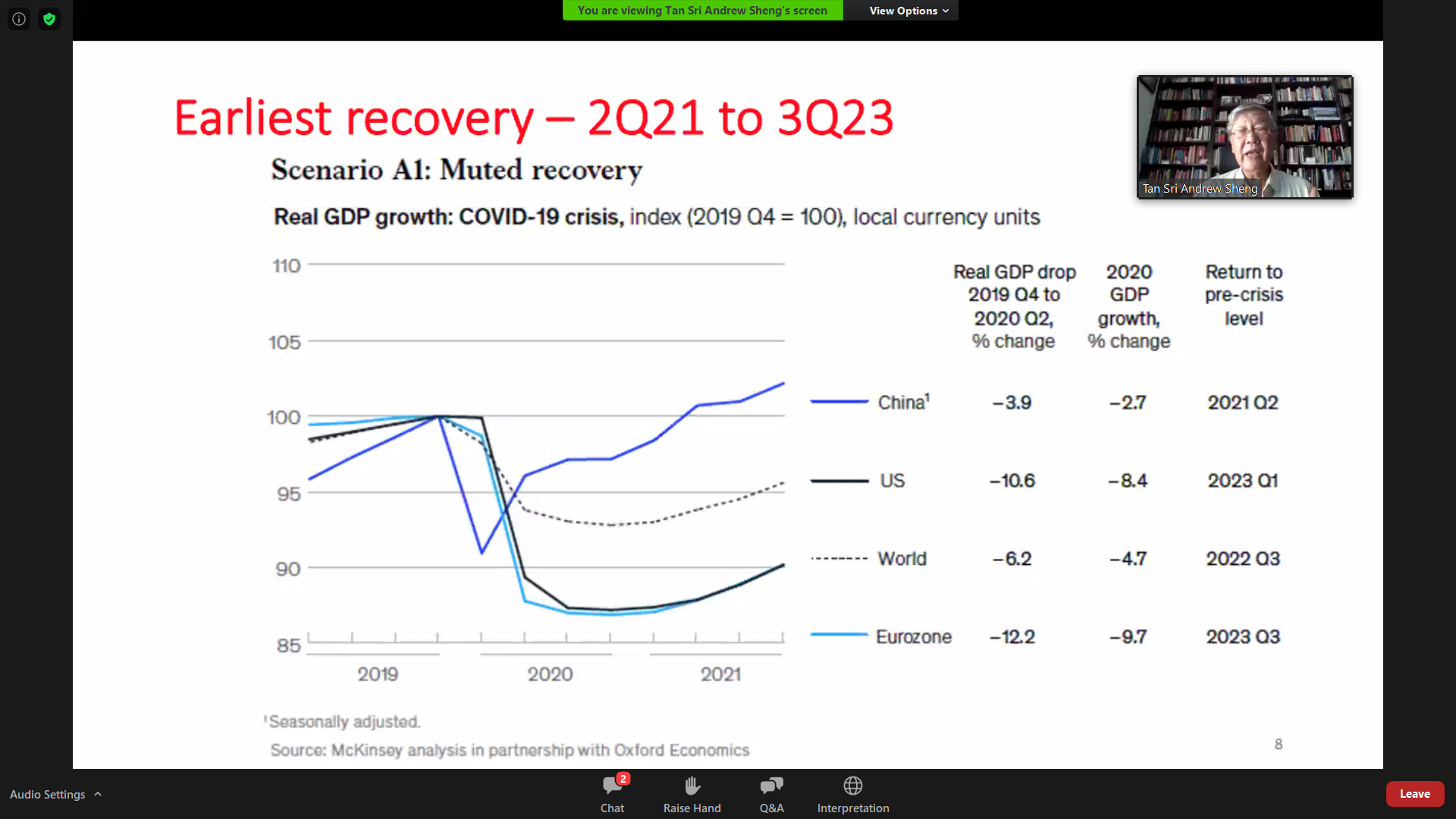
The research by Mckinsey states that
the earliest recovery of economies will take place in the second quarter of
2021 or third quarter of 2023
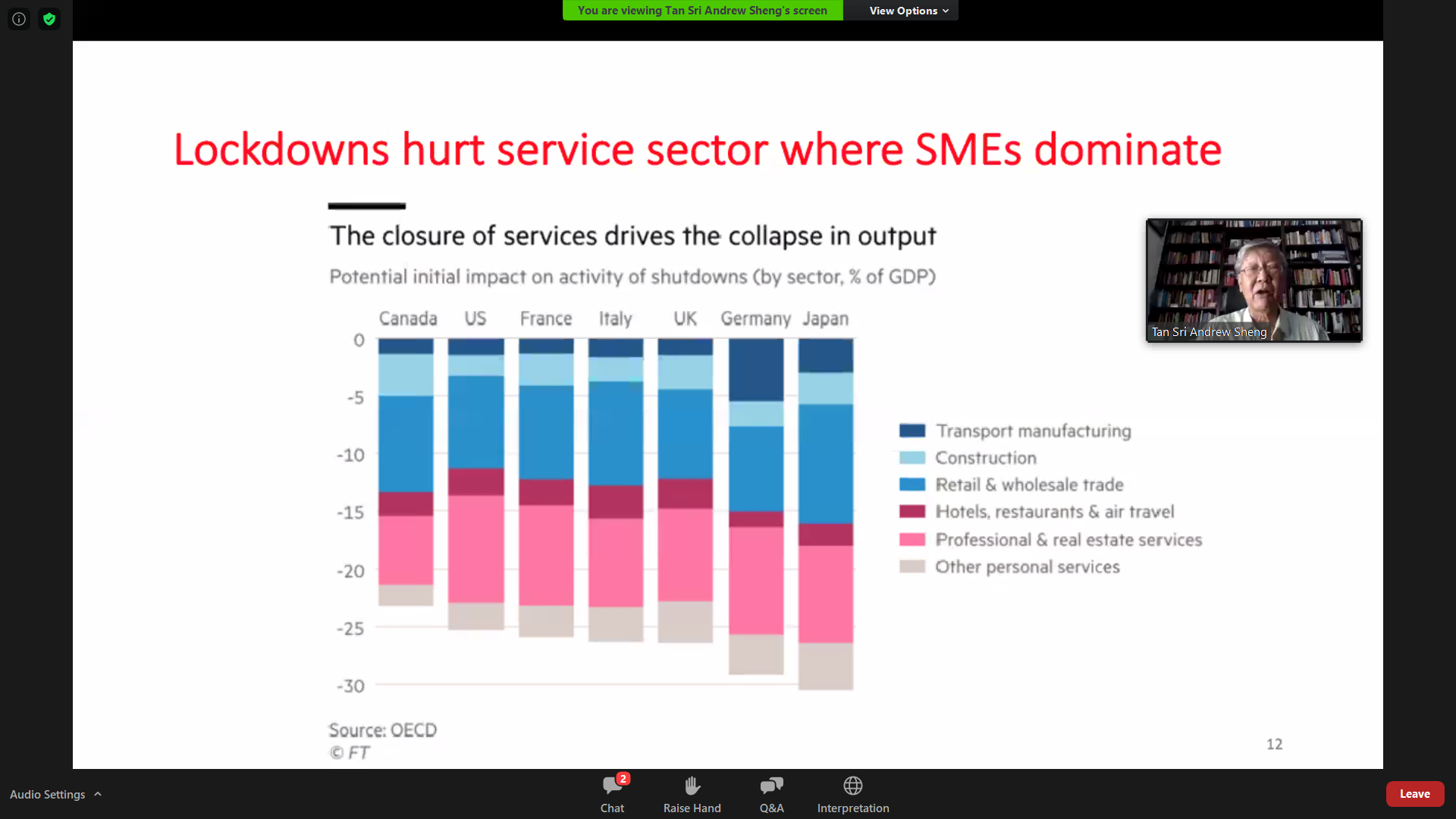
Most of the SMEs got affected during
the lockdown
Tan Sri Sheng explained, “Based on the data from
Organisation for European Economic Co-operation (OECE), the lockdown hurts
service sector where SMEs dominate.” He elaborated, “Lockdown stops the
movement of humans. The virus does not move but it is the human being that
moves and carries the virus. World trade is about people’s movement, the
world had stopped the plane, intercity activities, international business
and so on. The businesses that hurt the most are the small businesses.”
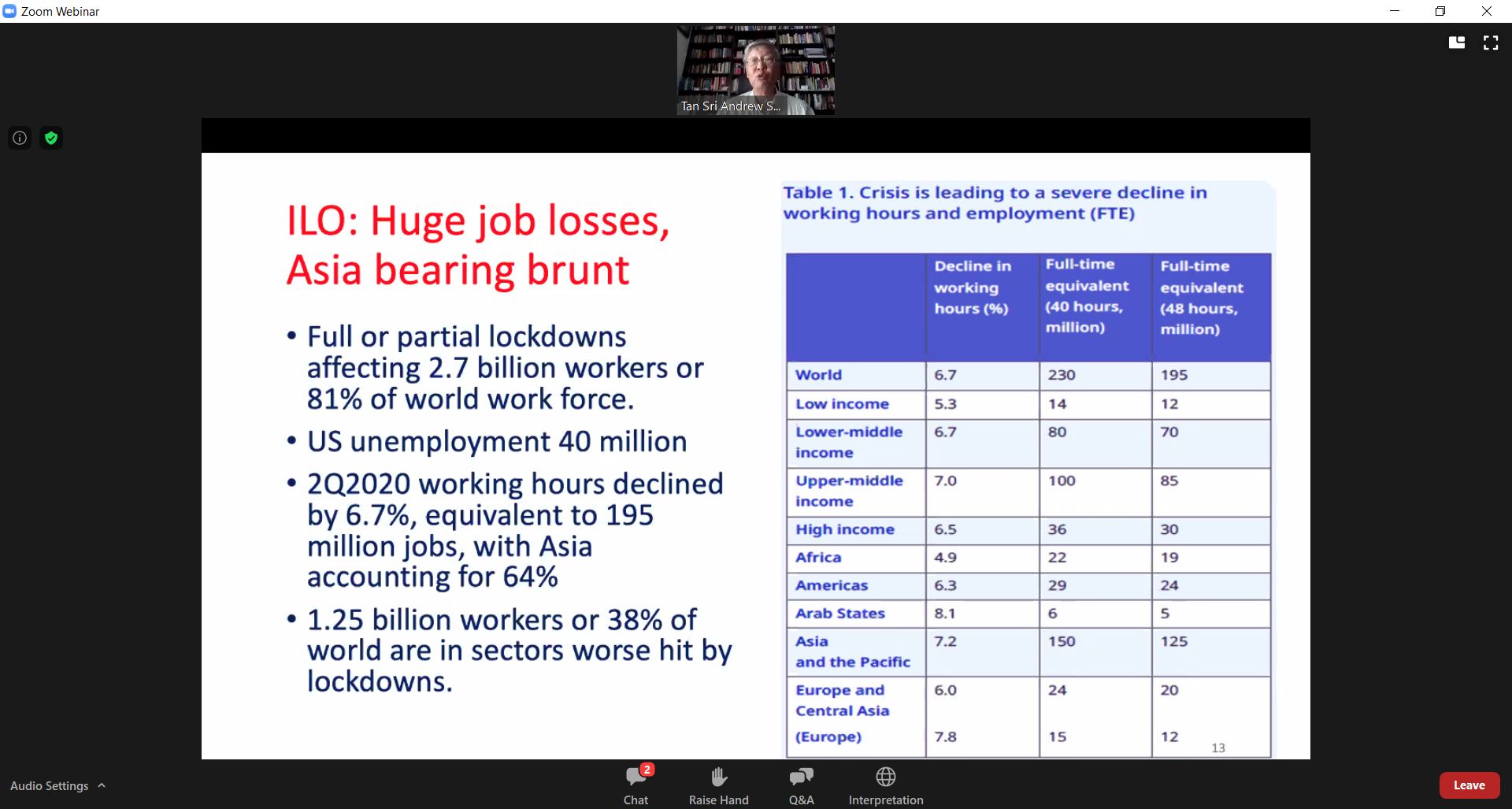
Job loss became world’s biggest issue
after the lockdown. The lockdown has affected 2.7 billion workers or 81% of
the workforce
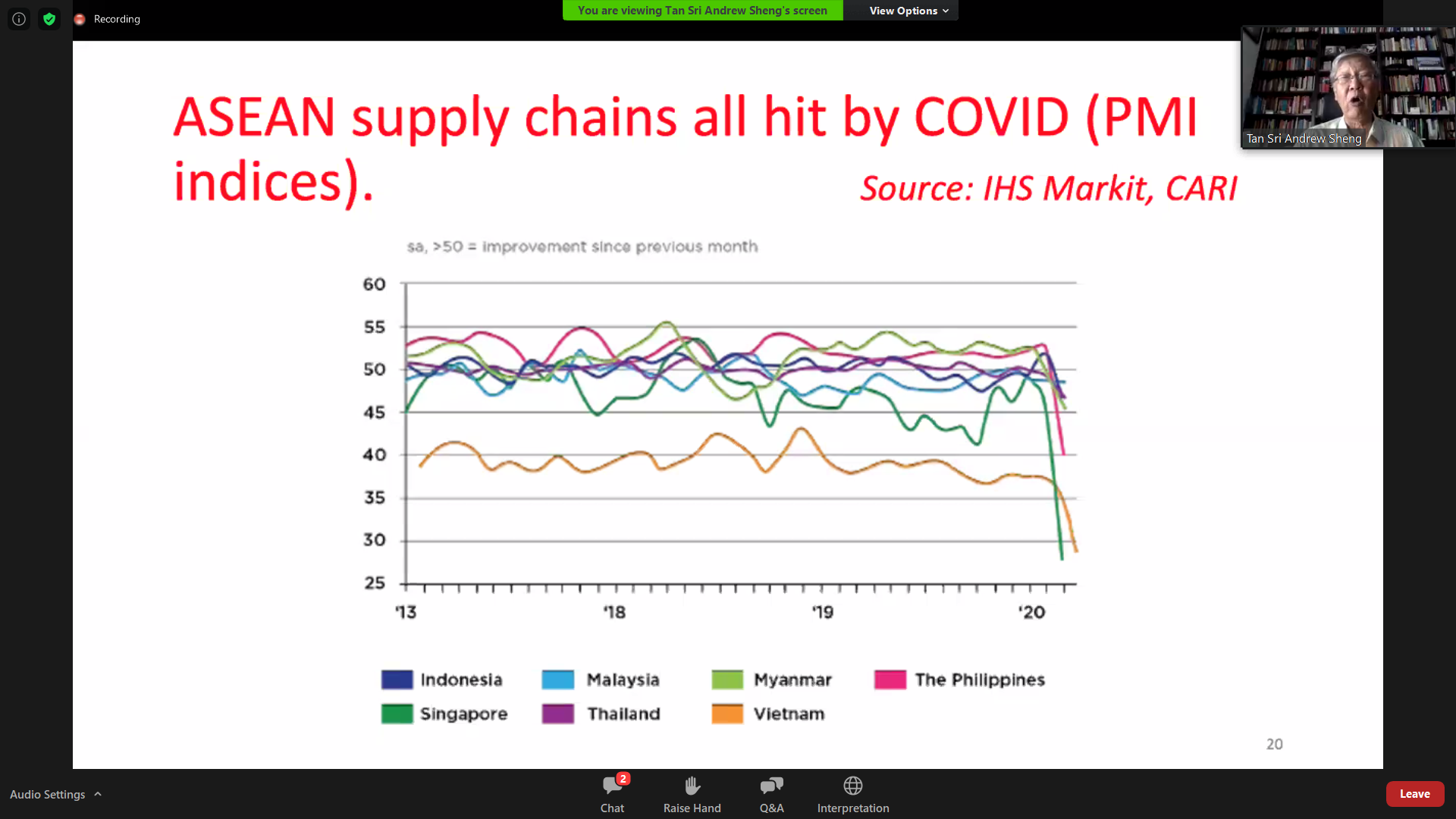
Purchasing Mangers’ Index (PMI)
showing ASEAN supply chains that are hit by COVID-19
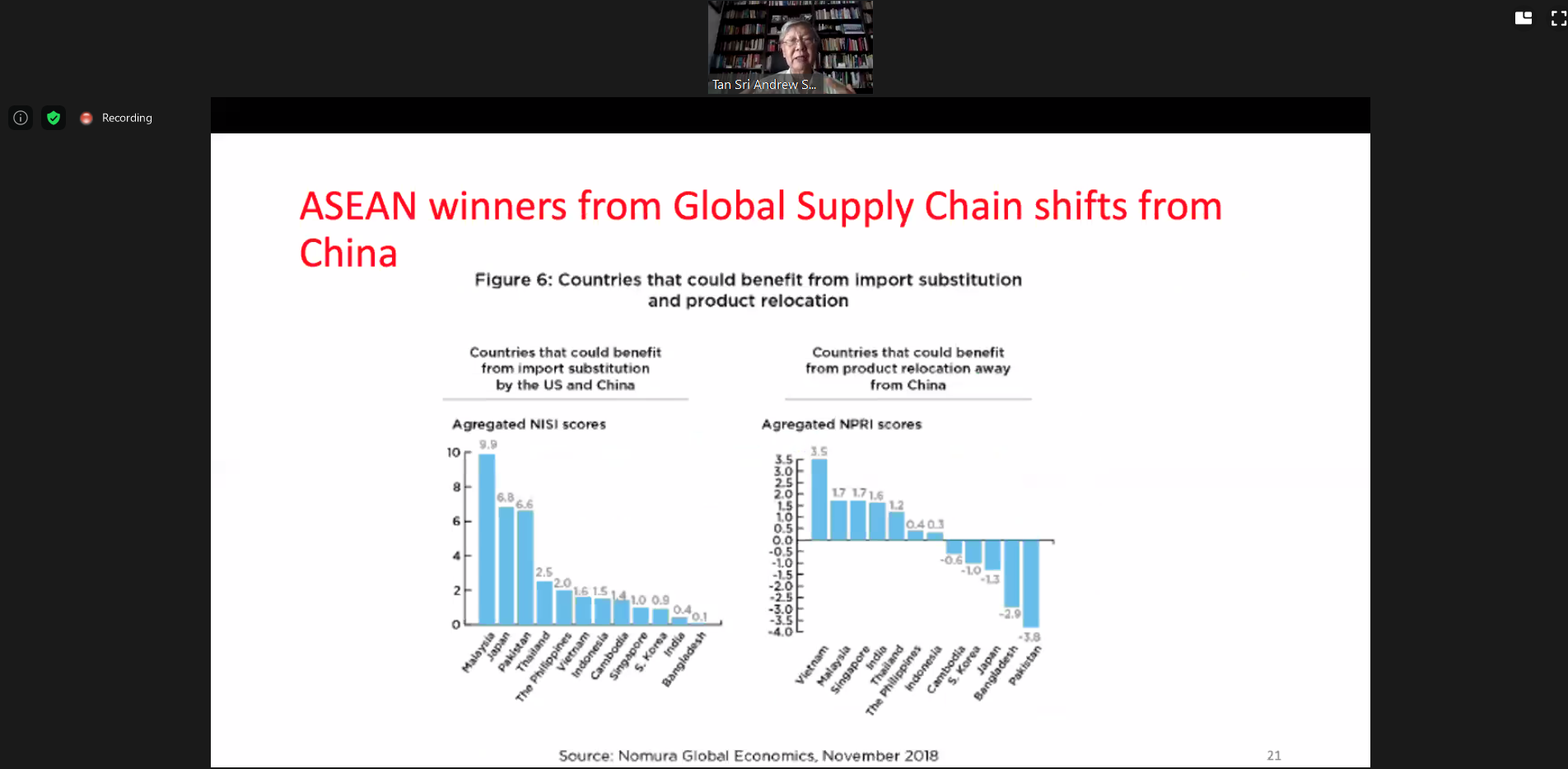
Tan Sri Sheng said ASEAN benefits in
the global supply chain from import substitution and product relocation by
US and China
Towards the end of the session, Tan Sri Sheng
concluded that we live in a very strong area hurt by global threat and
pandemic but China and ASEAN are in a good position to recover, reform and
restructure. East Asia is still the region with the most modern
infrastructure and well-trained labour force, open to trade and innovation
with the highest savings. China, India and ASEAN depend more on domestic
consumption to sustain growth and there is a huge opportunity for trade and
investment especially in the digital economy. CABA is playing a critical
role for Private-Public Partnership plus regional partnership to overcome
the challenges and recession.
The webinar was followed by a Q&A session between the
speakers and participants.
CABA, a non-profit and non-governmental organisation,
is a business promotion group and cooperation mechanism, and coordinates the
communications between chambers of commerce, industrial associations, trade
institutions and enterprises within China and ASEAN, under the framework of
China-ASEAN Free Trade Area to promote the trade and investment cooperation
in this region.
The full video of the webinar is uploaded on the
Facebook page “China-ASEAN Business Association”. Please click
https://www.facebook.com/Official.CABA/videos/1370526986481175/ if
you are interested to watch the full video. A total of 233 participants took
part in the live webinar via Zoom and as of 24 June 2020, there have been
8,120k views on Facebook.
Wholly owned by UTAR Education Foundation Co. No. 578227-M LEGAL STATEMENT TERM OF USAGE PRIVACY NOTICE